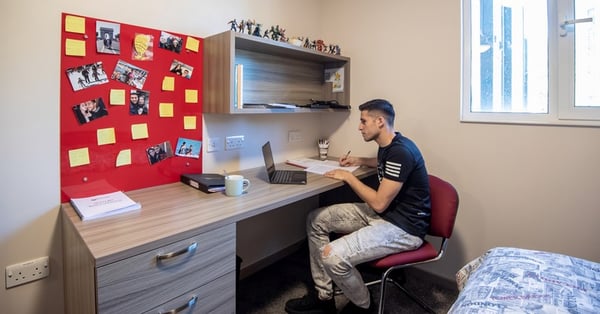We understand it’s not always easy to balance studying with your social life. You want good grades so you can go to the university of your choice but you also need time for yourself and the things you enjoy.

Don’t worry - with an organised study plan, you can do both. Here’s how to make a study plan and stick to it.
- Discover your learning style
- Spend time creating the study plan
- Set smaller goals that are realistic
- Create a study space
- Reward yourself
Discover your learning style

If you don’t know what style of learning is best for you, then it might make it harder to actually sit down and study.
There are seven different styles of learning. Which one describes you?
- visual: you prefer using pictures and images to learn so seeing information in charts and diagrams might be ideal for you
- aural: you prefer listening to sound when studying so podcasts might be something you enjoy
- verbal: you prefer using words, both in speech and writing to learn. Repeating what you’ve learned out loud might help you remember
- physical: you prefer using your hands to understand how something works. Use your sense of touch in activities to learn quicker such as making models and prototypes
- logical: you prefer using logic, reasoning and systems to figure things out. Mind maps work best for this style
- social: you learn better by discussing problems and theories in groups and with other people, so attend local study groups or organise one of your own
- solitary: you work better alone. Studying independently helps you understand easier
Whether it’s one of these styles or a combination of preferences, after you’ve decided what works best for you, it’s time to start making your study plan.
Spend time creating the study plan
When starting the study plan, you need to see how much time you can dedicate to studying. Be honest with yourself - outside of classes and lectures, you might have extracurricular activities you need to attend or commitments that can’t be moved. Make sure you have time for those too.
Ideally, you want to make sure you’re studying daily to get into a routine. Even if it’s just 30 minutes after dinner, it’s beneficial to make it a habit.
Once you know how much time you have available for studying, you can get started on planning. It’s essential to make a list of your exams and upcoming assignments, then what topics you need to learn for each one before the deadline.
TOP TIP: Don’t procrastinate by spending a lot of time designing your study plan. Use a spreadsheet on your laptop or write it down. As soon as you have your week organised, you need to start studying so you can cover all the topics in detail and get the grades you’ve worked hard for.
Set smaller goals that are realistic
When studying, set yourself smaller goals to help motivate you. Have one big goal, like getting the grades you need for Newcastle University, but also create smaller ones you can tick off along the way.
It might be memorising terminology or solving that problem you found difficult in class. If you know you’re struggling with a particular subject or topic, dedicate more time to it until you’re confident.
TOP TIP: Ask your teacher for previous exam papers and a list of topics that might be on the test. These are easy to work towards each week and helps you to identify what topics you need to revisit or give extra time to.
Create a study space

The best way to get in the right mindset for studying is to have a specific location for it. Your study space should be clean, organised and comfortable for maximum productivity.
However, try to avoid working on your bed. Having a separate space for relaxing can be nice after studying.
Think about what distracts you the most. Put your phone out of sight and turn your TV off when studying if you find yourself looking at those more than your books.
TOP TIP: To keep yourself on track, have a calendar and clock nearby. This helps you visualise your deadline and avoid overworking yourself.
Reward yourself
The hardest part about staying to a study plan can be getting started. Don’t feel like you have to sit there and study for hours without a break. It’s okay to reward yourself when you’ve achieved something.
TOP TIP: Go for a walk, spend time with friends, watch some TV and come back ready to learn after.
You’re more likely to stick to a study plan if you know you’re going to be rewarded when you’ve finally finished. If you start creating study plans at highschool, it’ll help you do the same when studying abroad. It’ll be worth it when your hard work enables you to come study abroad at a highly-ranked university like Newcastle University.
We have personal tutors who can offer you advice on both academic and personal issues. That includes helping you create a study plan for your university degree.
Creating study plans to help you achieve your grades for Newcastle University is just one important thing you need to do. It’s also essential to organise your finances so you can make sure you have what you need for studying over here.
Make a budget for your time at Newcastle University
You can use our student budget calculator to prepare a financial budget for your time here. It’s really simple and completely free to use. All you need to do is enter some information and it’ll work out how much you need to study abroad.
